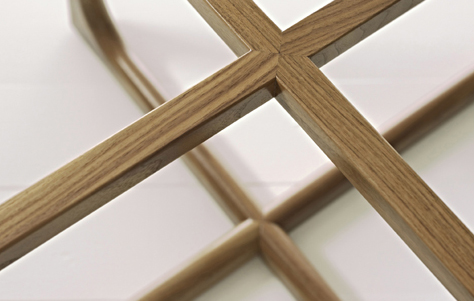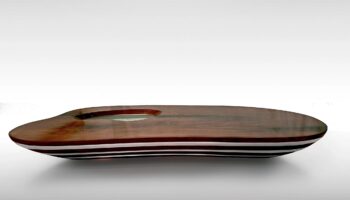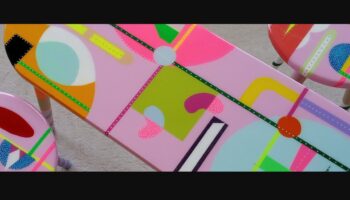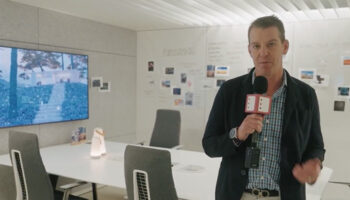Ace in the Hole: Loophole Coffee Table by Geiger
A loophole is defined as a way of escaping a difficult situation, or more literally, as a small hole or recess in a wall. Both of these meanings apply to the Loophole Coffee Table. Designed by Jay Chapman for Geiger International Inc., the Loophole series of coffee tables (as well as side tables) is an escape from the standard dimensions and designs of most occasional tables: Loophole’s simple base gives a sense of openness and its large glass surface gives a feeling of lightness. The various sizes and shapes of Loophole also offer an alternative to the typical coffee table fare. Loophole Coffee Tables also present a small hole, since the X shape of its base necessarily produces a niche of negative space.
Loophole 42” Round Coffee Table in Walnut. Designed by Jay Chapman. Manufactured by Geiger.
Coffee Tables from Sustainably Forested Wood

The line of Loophole tables is broad, with tables in 24”, 36”, and 42” sizes, offered in walnut, ash, and ebonized ash wood finishes. The glass table tops are available in round, square, and rectangular shapes as well. It’s all in the carefully turned legs, of course, since the appeal of Loophole is actually in what’s missing: you can almost get lost in the empty areas crafted by the sinuous base. And Geiger’s commitment to sustainability means that all Loophole tables use veneers “purchased from suppliers who practice sustainable forestry techniques, and approximately 60 to 80 percent of veneers used are domestically grown woods.”

The company’s environmental policies extend beyond materials. Geiger has established an initiative entitled Perfect Vision 2020, which has set the following goals: zero landfill, zero hazardous waste, zero air and water emissions, LEED Silver construction and 100 percent green energy. Already in 2010, two of these goals have been met: zero landfill and 100 percent green electrical energy.



About the Manufacturer: Geiger International, Inc. has been “enhancing business environments since 1964” when John Geiger established a company in Toronto, Ontario “fabricating architecturally designed office furnishings.” In 1968, the company began designing and manufacturing contemporary casegoods with the Kuypers series, a modular system of interrelated desks, tables, credenzas, and storage units. Geiger has continuously improved its office furnishings: in 1981, it introduced Petri Furnishings and Petri CaseSystems, “one of the first wood systems available”; in 1983, it introduced Tinta, a high-end painted systems furniture collection that incorporated radius corner door and drawer fronts and automotive-caliber painted finishes, including metallics.




Leave a Reply